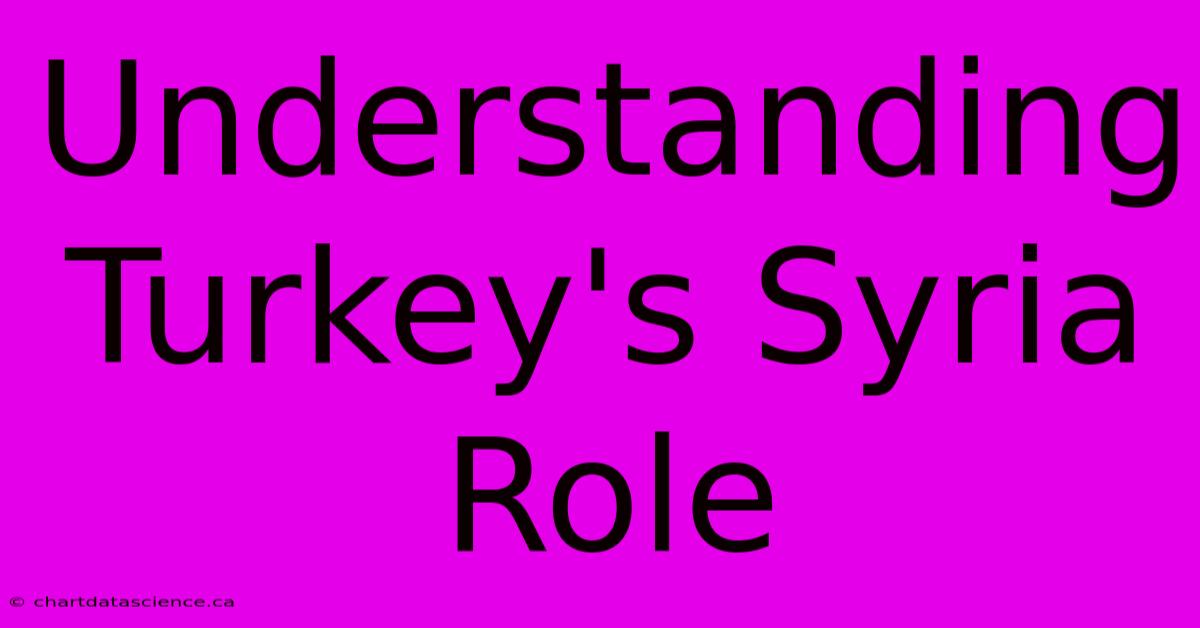Understanding Turkey's Syria Role

Discover more detailed and exciting information on our website. Click the link below to start your adventure: Visit My Website. Don't miss out!
Table of Contents
Understanding Turkey's Complex Role in the Syrian Civil War
Turkey's involvement in the Syrian Civil War is multifaceted and deeply rooted in historical, geopolitical, and security concerns. Understanding its role requires navigating a complex web of shifting alliances, strategic objectives, and domestic political pressures. This article delves into the key aspects of Turkey's actions in Syria, exploring its motivations, strategies, and the significant impact on the region.
Historical Context: A Shared Border and Complex Relationship
Turkey and Syria share a 911-kilometer border, a proximity that has historically fostered both cooperation and conflict. The two nations have a long and intertwined history, but their relationship has been strained by differing geopolitical ambitions and the rise of the Kurdish issue. Turkey's deep-seated anxieties about Kurdish autonomy in Syria, stemming from its own domestic Kurdish population, significantly shapes its Syrian policy.
The Rise of the Kurdish Issue: A Central Driver
The emergence of the Syrian Kurdish groups, particularly the People's Protection Units (YPG), affiliated with the Kurdistan Workers' Party (PKK) – considered a terrorist organization by Turkey – became a major catalyst for Turkish intervention. Turkey views the YPG's territorial gains in northern Syria as an existential threat, fearing the creation of a de facto Kurdish state along its border. This fear fuels Turkey's military operations and its support for anti-Kurdish factions within Syria.
Turkey's Strategic Objectives in Syria: A Multi-pronged Approach
Turkey's engagement in Syria is driven by several interconnected objectives:
1. Countering Kurdish Influence: The Primary Goal
Preventing the establishment of a Kurdish-controlled region along its border remains Turkey's paramount concern. This has led to numerous military operations targeting the YPG and its allies. The creation of "safe zones" in northern Syria is partly presented as a measure to address this concern, but also serves other strategic purposes.
2. Regime Change and Opposition Support: A Shifting Strategy
Initially, Turkey supported various Syrian opposition groups fighting against the Assad regime. However, this support has evolved, becoming more selective and aligned with Turkey's broader geopolitical goals. The backing of certain factions has been influenced by their perceived usefulness in combating Kurdish groups and other perceived adversaries.
3. Refugee Crisis Management: A Domestic Imperative
The Syrian Civil War triggered a massive refugee crisis, with millions of Syrians fleeing to neighboring countries, including Turkey. Turkey hosts the largest number of Syrian refugees globally, placing immense pressure on its resources and social fabric. Turkey's actions in Syria are, therefore, partly driven by a desire to manage this refugee influx and prevent further displacement.
4. Geopolitical Influence: Regional Power Dynamics
Turkey aims to enhance its regional influence and project power in the broader Middle East. Its involvement in Syria allows it to shape the post-conflict landscape and secure its strategic interests in the region. This ambition contributes to its complex relationships with other regional and international actors.
The Impact of Turkey's Actions: Regional Instability and International Relations
Turkey's actions in Syria have significantly impacted the regional dynamics and its relations with other countries. Its military operations have caused civilian casualties and contributed to further instability. The complex interplay of alliances and rivalries has also complicated international efforts to resolve the Syrian conflict.
Humanitarian Concerns: Collateral Damage and Civilian Suffering
Military operations and the displacement of populations due to conflict have resulted in significant humanitarian suffering. Concerns regarding human rights violations and the impact on civilian populations remain a persistent challenge.
International Relations: Strained Alliances and Shifting Partnerships
Turkey's actions have strained its relations with some Western allies who disagree with its approach, particularly concerning the targeting of Kurdish groups. Simultaneously, Turkey has forged closer ties with some regional actors who share its concerns about certain aspects of the Syrian conflict.
Conclusion: A Long and Uncertain Road Ahead
Turkey's involvement in the Syrian Civil War is a protracted and evolving narrative. Its actions, driven by a complex interplay of security concerns, domestic politics, and regional ambitions, continue to shape the conflict's trajectory and its impact on the wider region. The future of Turkey's role in Syria remains uncertain, dependent on the evolving political landscape both within Syria and across the international community. Understanding this complex interplay is crucial to comprehending the ongoing challenges in the region.

Thank you for visiting our website wich cover about Understanding Turkey's Syria Role. We hope the information provided has been useful to you. Feel free to contact us if you have any questions or need further assistance. See you next time and dont miss to bookmark.
Also read the following articles
| Article Title | Date |
|---|---|
| What You Need To Know Syrup Heist | Dec 07, 2024 |
| Michigan Bath And Body Works Candle Event | Dec 07, 2024 |
| Hoult And Collette Reunite About A Boys Mother | Dec 07, 2024 |
| Womens Fa Cup Fourth Round Draw Info | Dec 07, 2024 |
| Hoults Intense Nosferatu Viewing Experience | Dec 07, 2024 |
